You’re watching Netflix on a Sunday night as the show's credits roll. It’s 11:45 PM, and it’s time to shut your eyes, but your heart races as you recall the Mt. Everest of tasks awaiting on Monday.
Does that sound familiar? You’re not alone. According to a 2023 LinkedIn survey, 75% of people experience the Sunday blues that set in the night before work. And that’s why the bare minimum Monday trend started.
In this article, you’ll learn:
- What is “bare minimum Monday”?
- What caused this trend to start?
- What are the benefits and downsides of bare minimum Mondays?
What Is a Bare Minimum Monday?
"Bare Minimum Monday" means focusing only on critical tasks on Monday. The goal is to face a smoother transition between weekends and workdays, reducing stress and preventing burnout. With this definition in mind, it’s also crucial to know what a bare minimum Monday is not.
No Work Monday?
It’s easy to read the definition above and interpret it as “Mondays scrolling through social media with your feet in the air.” But that’s a misconception, and to understand why, you need to read the definition of “bare minimum.” According to the website Your Dictionary, it means:
The smallest possible quantity or the least fulfilling, but still adequate, condition that is required, acceptable, or suitable for some purpose.
So, the bare minimum Monday trend means doing what is necessary only but still meeting expectations and fulfilling obligations. This movement departs from the notion that employees should always strive to go the extra mile. Let’s dissect why.
How Did Bare Minimum Mondays Start?
Where do many trends start these days? TikTok. In 2022, Marisa Jo Mayes shared her work experience on the social media platform, mentioning that she felt strangled by the pressures of a corporate life that always expected more and more from her.
Committed to avoiding stress, Marisa prioritized self-care and a better work-life balance by dedicating Mondays to only the most urgent tasks. Her goal was to create a less sweat-inducing start to her week, and this approach resonated with millions worldwide, with content on this subject gaining over 470 million views on TikTok. It’s easy to see why:
- 77% of employees experience burnout often, according to Deloitte.
- 57.9% of Americans work with a flexible schedule, according to a 2023 Workable survey.
- Monday is the most hated day, according to our 2023 study, The Truth about Mondays.
Stressed workers + flexible hours = attempts at a better work-life balance. For many, a bare minimum day was an attractive solution. And since Monday is the most hated day, it’s also the most logical target for people. But that begs a critical question.
What Does a Bare Minimum Monday Look Like?
A bare minimum Monday focuses on avoiding overwhelming responsibilities, emphasizing self-care and relaxation by concentrating on the following areas:
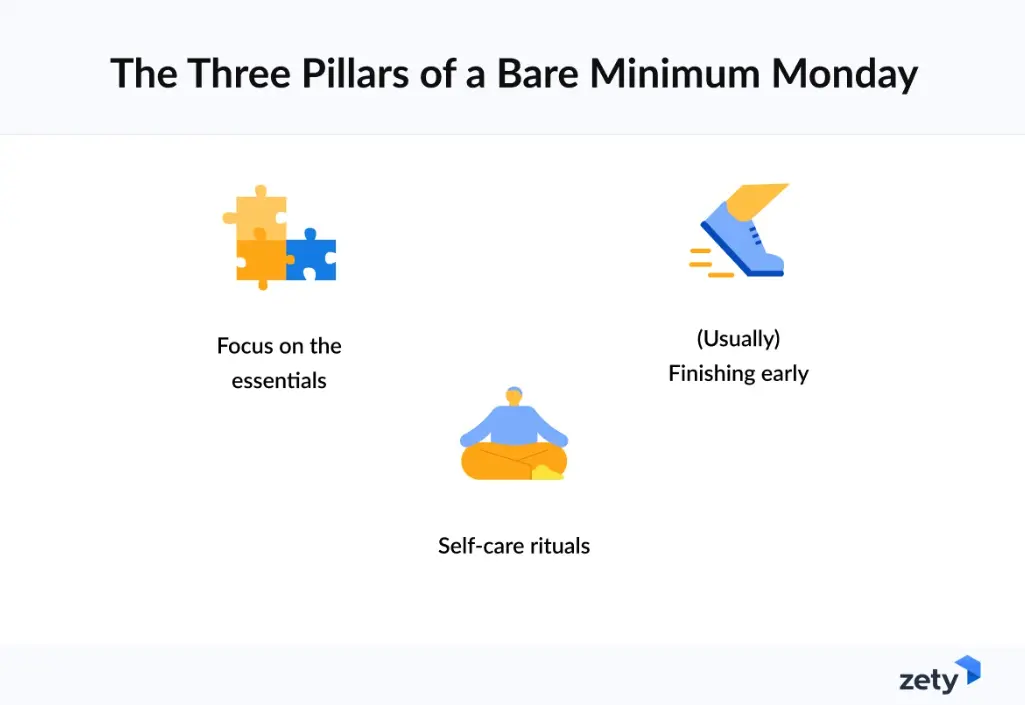
- Self-care rituals: A slower pace means having more time to yourself, and it’s essential to use it well. Some people can take this opportunity to jog, meditate, or have a slow morning coffee before starting to work.
- Prioritizing essentials: What absolutely needs to happen today? Do that. Focus on the urgent tasks and postpone less critical ones.
- Reduced pressure: A bare minimum Monday also involves avoiding meetings. Of course, that isn’t always possible, so try to schedule them for the afternoon at least.
- Flexible workflow: Bare minimum Mondays often mean finishing work earlier than usual. During this time, you can work on creative projects or focus on unwinding.
This approach can have many benefits, but it also has potential downsides you must consider before having bare minimum Mondays yourself. Let’s start with the benefits.
The Benefits of Bare Minimum Mondays
Starting the week slowly can bring you some benefits, including:
Improved Mental Health
Incorporating self-care and prioritizing well-being helps reduce anxiety and stress, especially if you suffer from the “Sunday blues” before the start of the workweek.
Enhances Work-Life Balance
A bare minimum Monday encourages a more balanced approach to managing personal and professional priorities. The slower pace allows time for self-care activities.
Boosts Morale
Feeling less stressed at your job can shift how you perceive it. What seemed like an overwhelming experience is now manageable, making it much easier to feel motivated.
These are great benefits, no doubt. But nothing is perfect, so there will always be downsides, and you must consider them before deciding if you should start having bare minimum Mondays.
The Downsides Of Bare Minimum Mondays
Let’s consider some negative aspects to decide whether having bare minimum Mondays is good for you.
Not Always Possible
Some jobs require full attention at all times. Think of customer service, for example. Good luck telling clients to wait because you need a slow start to your week. The same applies to healthcare, for instance, and any job that requires immediate attention or has strict deadlines.
Bare Minimum Monday, Tuesday, Wednesday, Thursday, and Friday
You can start having bare minimum Mondays as an honest way to stay sane. But it feels good to avoid non-urgent tasks, doesn’t it? And so, your bare minimum Monday also stretches into a bare minimum Tuesday, Wednesday, and so on. Before you know it, you’ve accumulated a lot of work. Flexible work hours are a blessing but require a lot of responsibility.
It Can Add Stress
It may feel odd to hear this, but it’s true. When you avoid many tasks on Monday, you could increase your workload on other days. So, the comfort of a slow start to the week quickly morphs into the anxiety of racing to meet a deadline. Think ahead when deciding if having a bare minimum Monday is the right call.
Misinterpretation
Your manager won’t know why you do the bare minimum on Mondays. Even if you’re still technically meeting expectations, they’ll notice that your performance has dropped, which they could see as a lack of motivation or commitment, hurting career prospects. Before having bare minimum Mondays, consider if that aligns with what you want for your future in this organization.
This information will help you decide whether having bare minimum Mondays is a good move for you. If you’ve decided this sounds like an excellent idea, we want to share a question worth asking.
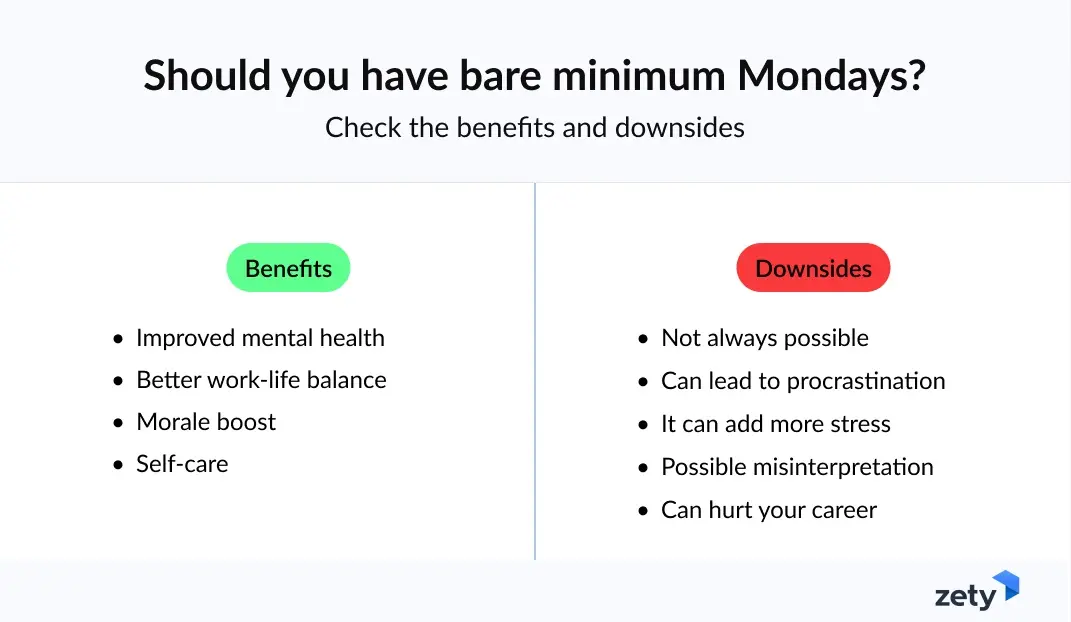
Should a Bare Minimum Day Be on Mondays?
Just think about it. Monday is the first day after the weekend, so it’s the moment of the week when your batteries are still at 100%. Wouldn’t it be better to use that energy to do as much as possible on Monday and have an easier time during the week?
Reddit user “Hefty-Set5236” sums it up in a post about bare minimum Mondays: “I always front load my weeks. I would much rather work hard on Monday than a Friday when I'm already burnt out.” We have the data to support this idea.
According to our 2023 study, The Truth About Mondays, the first day of the week is the second most productive, with Wednesday claiming the gold medal. The last place goes to Friday. We reached these conclusions after interviewing 1,000 American workers on the subject, and when we asked them about their most productive days, here’s what they said:
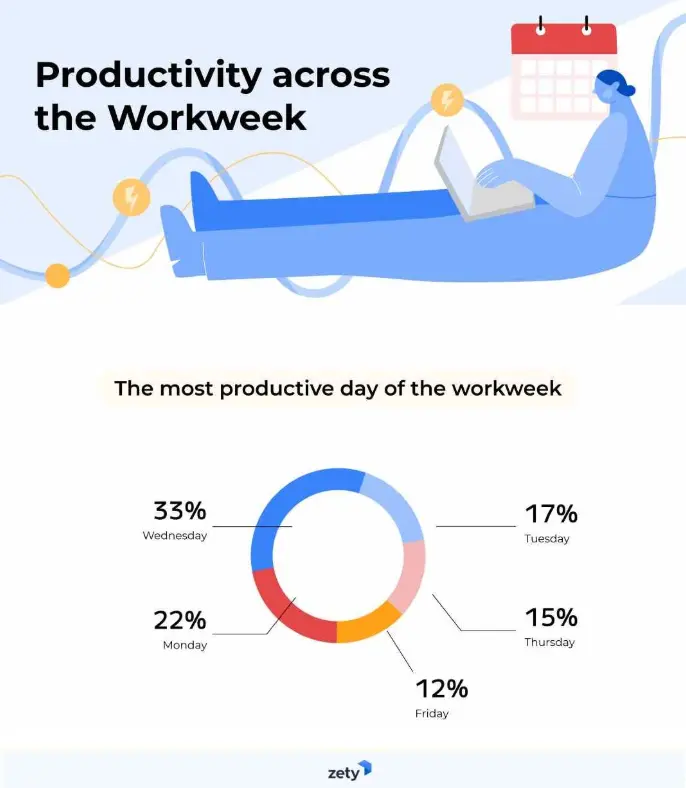
- Wednesday: 33%
- Monday: 22%
- Tuesday: 17%
- Thursday: 15%
- Friday: 12%
It’s easy to understand why Friday is at the bottom. Accumulated fatigue causes performance to take a nosedive on Fridays as people anticipate the weekend. So, ask yourself a question.
Why let tasks accumulate and deal with them at the height of fatigue? Doing so can even hurt your weekend. You get burnt out on Friday, so you can’t fully enjoy the leisure activities planned for the weekend. With less enjoyable rest during these days, your batteries don’t recharge to 100%, making the following week even more difficult. It’s a cycle.
A bare minimum Friday could be more appropriate. It lets you enter the weekend more relaxed, ensuring you’ll have more energy for the next week. Of course, you’ll need to work hard the other days to compensate for that, but it might make more sense than a bare minimum Monday.
Each case is unique, just like anything about human behavior. So, deciding which approach works best is up to you.
How Can Bare Minimum Mondays Impact the Future?
The 40-hour workweek is so ingrained in our society that imagining a different way of life is virtually impossible. But in our 2023 study, The Truth About Mondays, we asked 1,000 American workers their thoughts. Here are some of our findings.
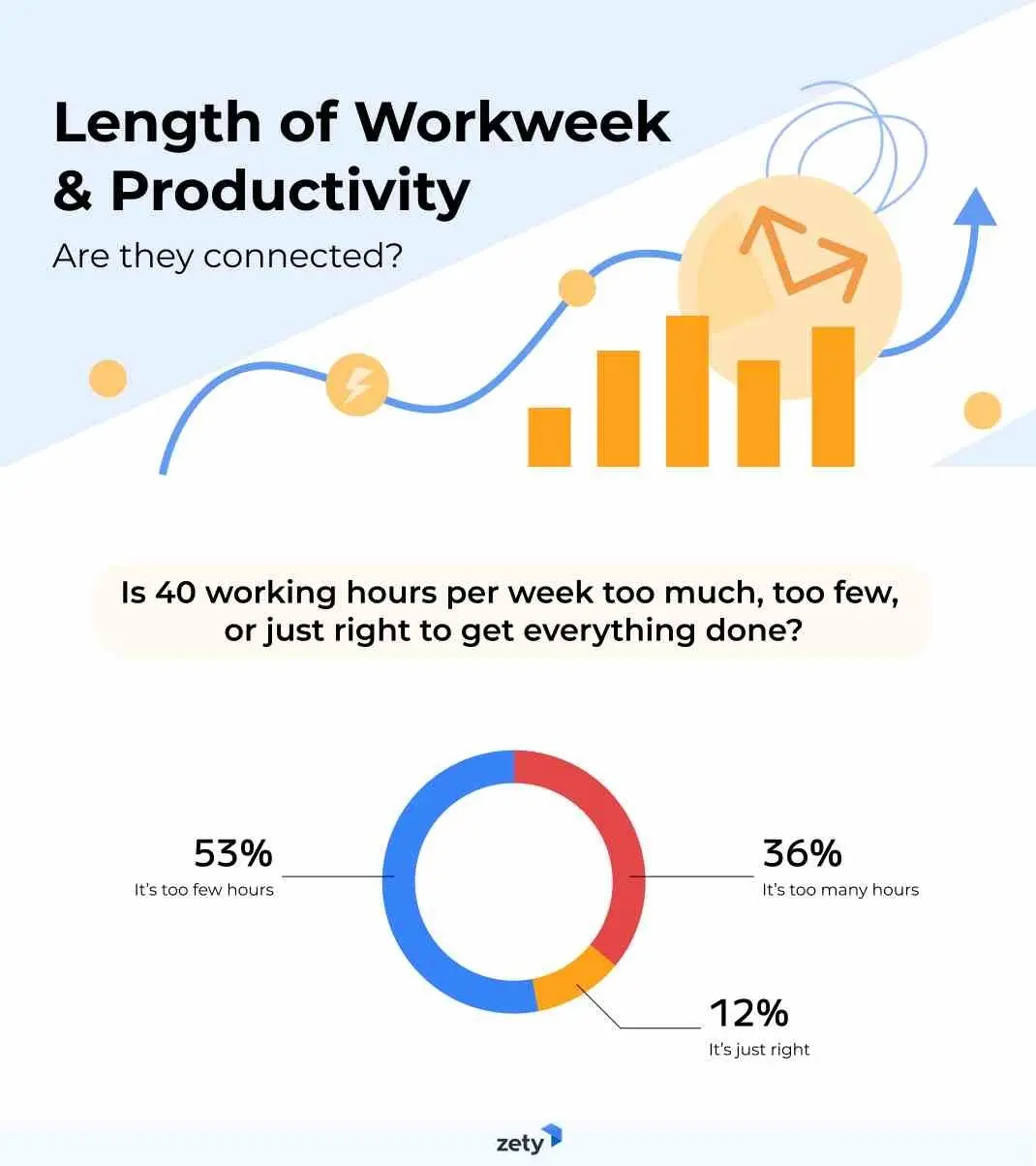
- 53% think 40 working hours per week is insufficient to complete everything.
- 85% support the idea of a 4-day workweek.
- 81% believe a 4-day workweek would boost their productivity and motivation.
Some CEOs agree with our respondents and have tried experimenting with a 4-day workweek. Here are some companies that have tried it:
- Microsoft
- Unilever
- Bolt
It’s easy to imagine that this would hurt their results. After all, less work equals less productivity, right? Wrong. Here are the results that some companies have obtained after experimenting with a 4-day workweek.
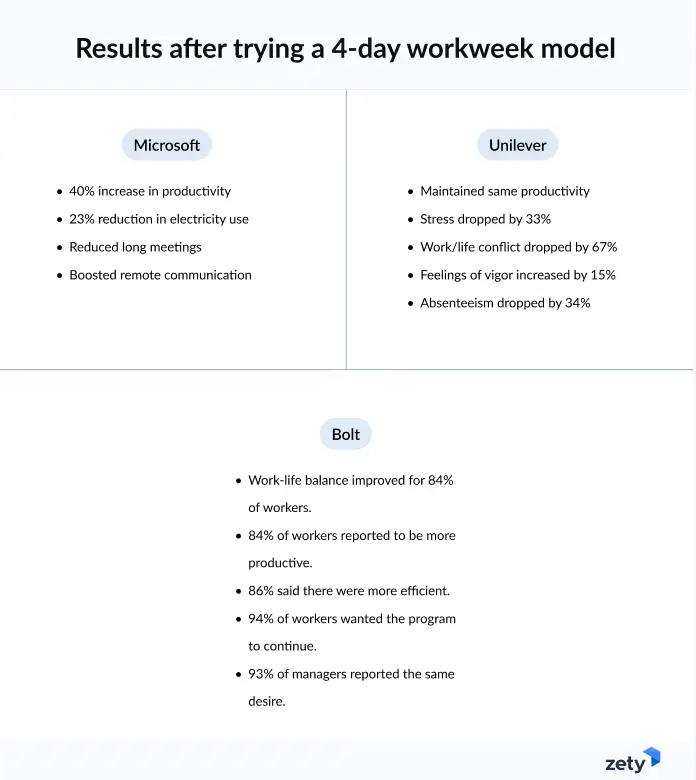
- Microsoft: 40% increase in productivity and a 23% reduction in electricity use.
- Bolt: 86% of employees reported being more productive.
- Unilever: Maintained the same productivity level.
The reason for these numbers is simple. According to a 2022 report, 71% of employees reported lower levels of burnout during a 4-day workweek.
However, despite these encouraging figures, most companies hesitate to experiment with a four-day workweek. We want to point out two critical reasons for that.
The first is the cultural shift. Changing our schedules after almost 100 years is nearly unimaginable to some people, but the bare minimum Mondays can help.
Embracing bare minimum Mondays can let companies create a hybrid between a 4 and a 5-day workweek, enabling them to reap some of the benefits of the former while still being close to the latter. This approach could be a potential solution to this problem. But, as we mentioned, there are two issues at play here. That was the first, and now we need to discuss the second.
The 4-Day Workweek Caveat
The studies on 4-day workweeks are recent. Therefore, it’s impossible to say what will happen in the long term, primarily because of a psychological phenomenon called “hedonic adaptation.”
Have you ever met a milestone in your life? You probably felt elated, but eventually, you returned to how you felt before reaching that goal. It may take weeks or months, but odds are your brain just went back to what it was before that achievement or event.
For example, think of lottery winners. According to the researchers Brickman and Campbell, lottery winners experienced a temporary boost in happiness, but within a year, their emotional state returned to normal.
That’s the concept of hedonic adaptation at play, and it’s a crucial reason why most companies are reluctant to embrace the 4-day workweek.
The studies reporting higher productivity and happiness under the 4-day workweek model are recent. So, it’s possible that the excitement of having one fewer day of work will eventually wear off, and people will return to their old happiness and productivity levels. If that happens, with just 4 days of work, the total output of their labor will be lower than it is today with 5.
If the 4-day workweek becomes the norm, it’ll be challenging to ask people to return to the 5-day workweek we have today if something goes wrong in the long term. That scenario can make companies hesitant to take action.
Of course, there’s no guarantee that this will happen. After all, the same argument was made when people stopped working 16 hours every day, as they did during the Industrial Revolution. It’s safe to say we’re all happier and more productive now.
Conclusion
Embracing bare minimum Mondays could be a compromise that lets companies assess the long-term impact of reducing their current workload without committing to eliminating one day from their weekly schedule. It could help companies transition into a system that makes employees happier and more productive. But whether that future is sustainable… well, only the future can tell.
Sources
- Brickman, P., Coates, D., & Janoff-Bulman, R., Lottery winners and accident victims: Is happiness relative?
- Deloitte, "Workplace Burnout Survey"
- Great Place to Work, Bolt’s 4-day Workweek Boosts Employee Happiness and Well-being
- SAP, The 4-Day Workweek Paradox
- Science Direct, Is Lasting Change Possible? Lessons from the Hedonic Adaptation Prevention Model
- University of Cambridge, Would you prefer a four-day working week?
- University of Technology Sydney, UTS research reveals success of Unilever four-day work week
- Workable, “Flexible work hours: it’s important for 58% of US workers, survey finds”
- Zety, “The Truth About Mondays”
About Zety’s Editorial Process
Our editorial team has reviewed this article to ensure it follows Zety's editorial guidelines. We’re committed to sharing our expertise and giving you trustworthy career advice tailored to your needs. High-quality content brings over 40 million readers to our site every year. But we don't stop there. Our team conducts original research to understand the job market better, and we pride ourselves on being quoted by top universities and prime media outlets worldwide.


